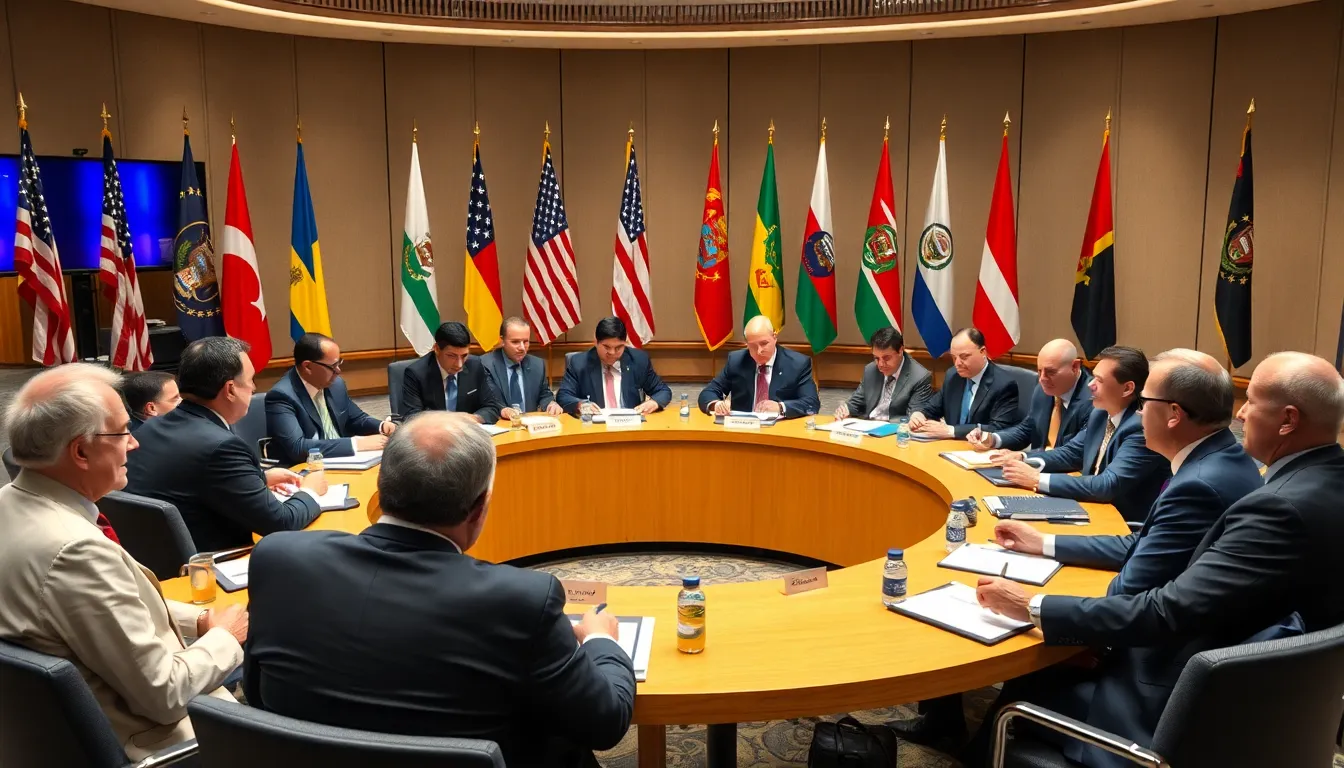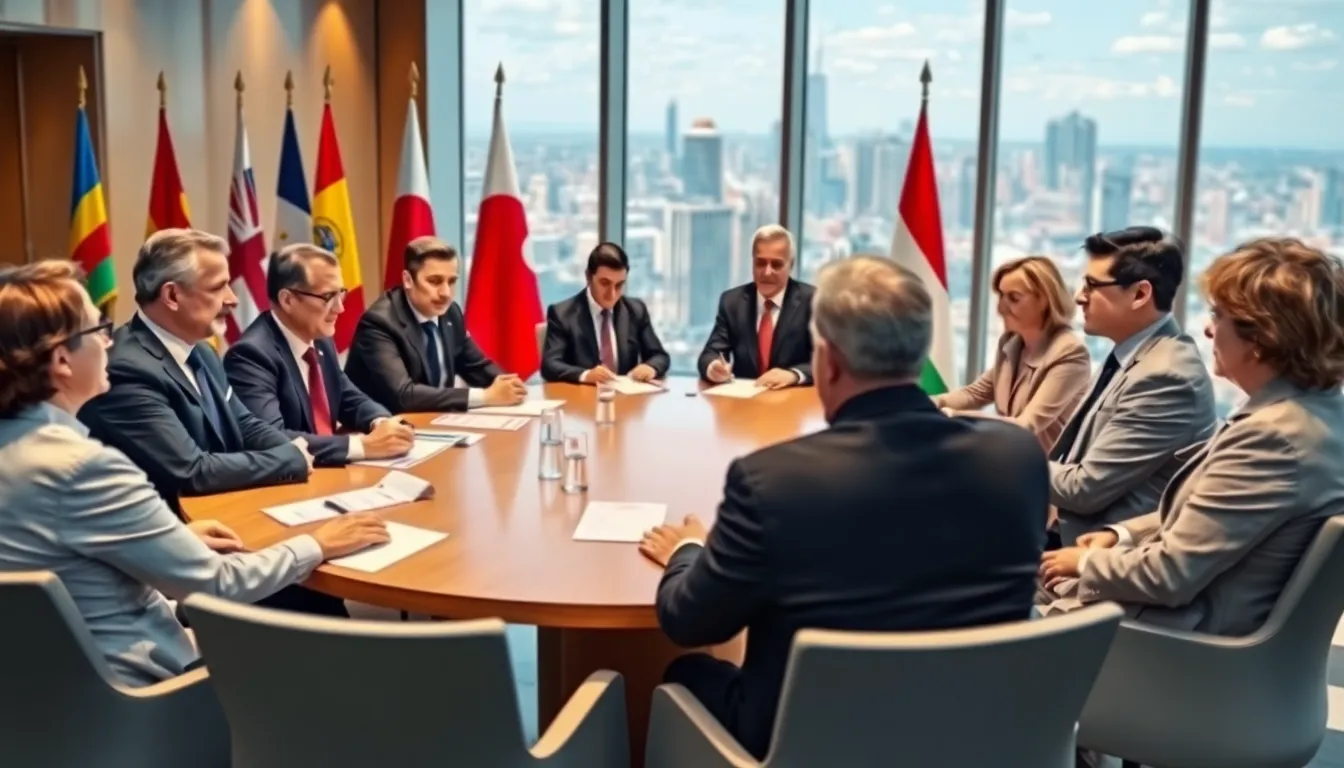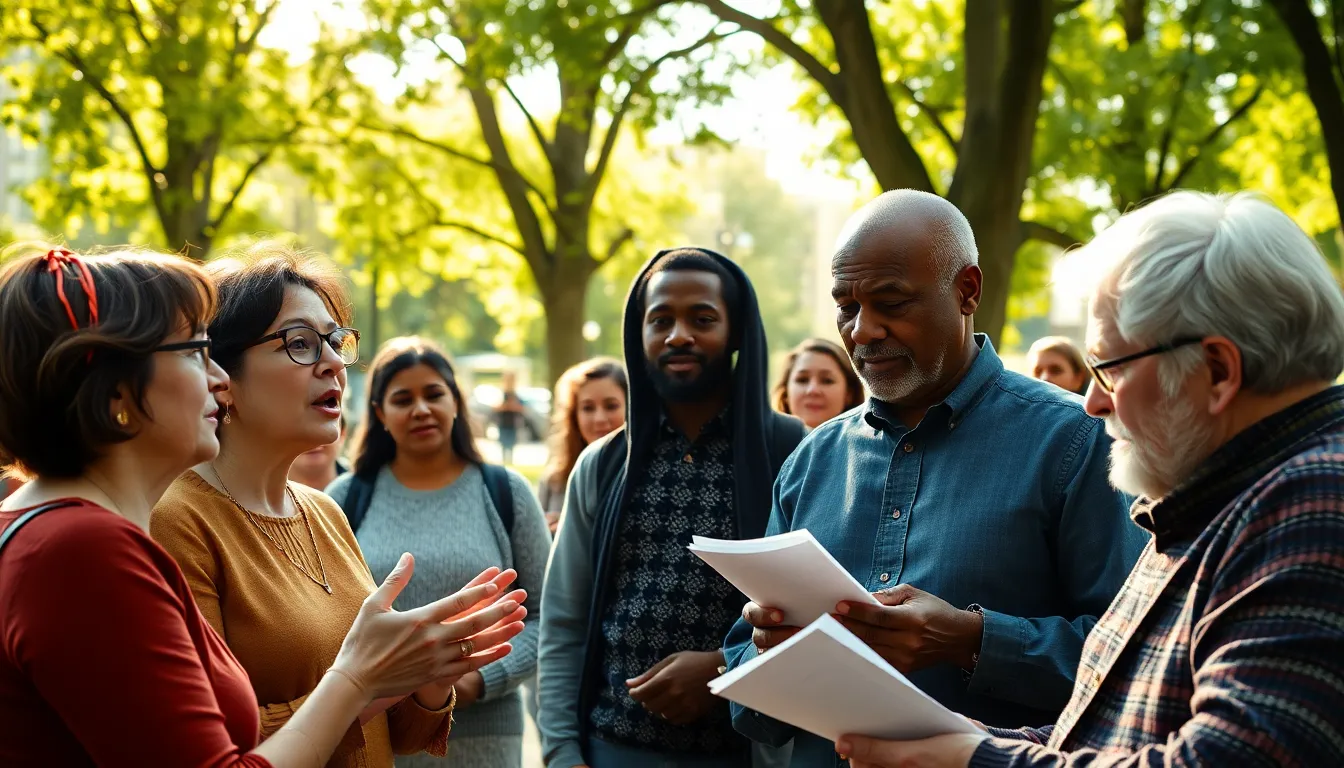In an increasingly interconnected world, diplomatic channels play a crucial role in fostering international relations and resolving conflicts. These channels serve as vital conduits for communication between nations, allowing them to negotiate agreements, address grievances, and collaborate on global issues. Understanding how these channels operate can shed light on the complexities of diplomacy and the art of negotiation.
Effective diplomatic channels not only facilitate dialogue but also help build trust among nations. Whether through formal treaties or informal discussions, these pathways enable countries to navigate the intricate landscape of international politics. As global challenges continue to evolve, the importance of maintaining open and effective diplomatic channels cannot be overstated.
Table of Contents
ToggleOverview of Diplomatic Channels
Diplomatic channels serve as vital conduits for communication between nations. These platforms enable negotiations, address grievances, and facilitate collaboration on global issues. The channels play a crucial role in conflict resolution; they provide a means to diffuse tensions through dialogue.
Types of diplomatic channels include:
- Bilateral Channels: These involve direct communication between two countries. They often result in agreements on trade, security, or cultural exchanges.
- Multilateral Channels: These channels include multiple nations, often through international organizations like the United Nations. They address larger issues like climate change, human rights, and global security.
- Informal Channels: These encompass unofficial discussions often conducted outside formal governmental structures. They promote flexibility and can lead to breakthroughs in strained relations.
- Embassies and Consulates: These act as official representatives of one nation in another country. They handle day-to-day diplomatic responsibilities, including visa processing and citizen assistance.
Effective diplomatic channels strengthen international relations by fostering trust and understanding. They are essential for navigating the complexities of contemporary global politics, particularly as global challenges evolve.
Types of Diplomatic Channels

Various types of diplomatic channels facilitate communication between nations, each serving distinct functions in international relations.
Bilateral Channels
Bilateral channels involve direct communication between two countries. These channels enable leaders and diplomats to negotiate treaties, resolve disputes, and address shared interests. Examples include state visits, direct phone calls, and official letters between heads of state. Such channels foster intimacy and trust, allowing nations to engage in detailed discussions on specific issues.
Multilateral Channels
Multilateral channels involve multiple countries collaborating on issues of common interest. These channels often operate through international organizations such as the United Nations, NATO, or the World Health Organization. Multilateral dialogues facilitate broader discussions, allowing nations to tackle issues like climate change and global security collectively. Examples include international summits, conferences, and treaties that require consensus among various stakeholders.
Importance of Diplomatic Channels
Diplomatic channels play a crucial role in maintaining effective international relationships and addressing global challenges. They streamline communication and facilitate collaboration between nations, which is essential in today’s interconnected world.
Conflict Resolution
Conflict resolution benefits significantly from established diplomatic channels. These channels allow for timely communication and negotiation, which are vital in de-escalating tensions. Through direct discussions, countries can clarify misunderstandings, propose solutions, and reach agreements. Examples of conflict resolution mechanisms include peace treaties and mediation efforts by neutral parties. The effective use of these channels can lead to lasting peace agreements, reducing the likelihood of future disputes.
International Cooperation
International cooperation relies on robust diplomatic channels to tackle pressing global issues. These channels enable nations to work together on multifaceted problems such as climate change, terrorism, and public health crises. Collaborative efforts, often organized through multilateral forums like the United Nations, provide a platform for shared initiatives and resource allocation. Countries can leverage their collective expertise and resources to enhance global welfare, demonstrating the significance of effective diplomatic engagement in addressing humanitarian challenges.
Challenges Facing Diplomatic Channels
Several challenges hinder the efficacy of diplomatic channels, impacting international relations and conflict resolution. These challenges stem from political barriers and technological advancements.
Political Barriers
Political barriers frequently obstruct effective communication among nations. Conflicting national interests often lead to disagreements, limiting cooperation. Political ideologies can also create significant rifts, making constructive dialogue difficult. Additionally, domestic pressures within states may compel leaders to adopt rigid stances, further complicating negotiations. Sanctions imposed by countries on others can isolate nations, curtailing vital dialogues that might resolve conflicts. Historical grievances, such as territorial disputes or past conflicts, also contribute to entrenched positions that inhibit open communication.
Technological Advancements
Technological advancements present both opportunities and challenges for diplomatic channels. The rise of digital communication has transformed how nations interact, enabling real-time information exchange. However, reliance on technology also raises concerns regarding cybersecurity. Cyber threats can compromise sensitive diplomatic communications, potentially leading to misunderstandings or escalations. Moreover, misinformation and disinformation campaigns, facilitated by social media, can complicate diplomatic efforts. States must navigate the digital landscape carefully to ensure accurate and secure communication while maintaining public trust in diplomatic processes.
Future of Diplomatic Channels
The future of diplomatic channels hinges on adapting to an ever-changing geopolitical landscape. Increasing interdependence among nations emphasizes the importance of efficient communication mechanisms. Countries must leverage technology, enhance traditional practices, and address emerging global challenges.
Technological Integration
- Digital Platforms: Digital communication platforms like video conferencing streamline discussions, making negotiations more accessible.
- Artificial Intelligence: AI tools can analyze vast data sets, enabling diplomats to identify trends and craft informed strategies.
Evolving Global Issues
- Climate Change: Collaboration among nations becomes critical to address climate challenges. Multilateral treaties focusing on sustainable practices will likely become more common.
- Cybersecurity: Ensuring secure information exchanges will remain a priority as threats evolve. Governments must develop protocols to safeguard sensitive diplomatic communications.
Informal Diplomacy
- Track II Diplomacy: Unofficial dialogues between non-state actors can lead to progress in conflict resolution. Engaging academics, business leaders, and civil society will enhance understanding and cooperation.
- Cultural Diplomacy: Countries may place greater emphasis on cultural exchanges to build trust and foster relationships beyond political agendas.
Multilateral Cooperation
- Strengthened Alliances: Countries will increasingly rely on international organizations to coordinate responses to global challenges. Cooperation in arenas like public health and terrorism is essential to fostering resilience.
- Sustainable Development Goals: Adhering to international frameworks like the UN’s SDGs will guide diplomatic efforts aimed at promoting global welfare.
Overcoming Challenges
- Addressing Political Barriers: Nations must work alongside conflicting interests, finding common ground to improve the efficacy of diplomatic channels.
- Managing Misinformation: Enhancing public understanding of diplomatic processes can mitigate the impact of misinformation on international relations.
The evolution of diplomatic channels remains pivotal in shaping global interactions and fostering resilience against future challenges.
Diplomatic channels remain essential for fostering international relations and addressing global challenges. Their ability to facilitate communication and build trust among nations is crucial in today’s interconnected world. As geopolitical landscapes evolve and new issues arise, adapting these channels to incorporate technology and innovative approaches will be vital.
Overcoming political barriers and misinformation will further enhance their effectiveness. The future of diplomacy hinges on collaborative efforts that transcend traditional boundaries, ensuring that nations can work together to tackle pressing global issues. Ultimately, effective diplomatic engagement is the cornerstone of a more peaceful and cooperative international community.



